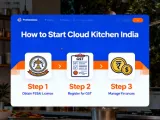Do you want to enter the food business but do not know the legal procedures you should follow before selling your products? Most people enter the food business unaware that they require proper FSSAI registration, which causes issues afterwards.
If you want to sell food or prepare food in India, either from home, a shop, or a factory, this guide will make the entire process of FSSAI registration easy and simple for you to comprehend.
Table of Contents
What is FSSAI ?
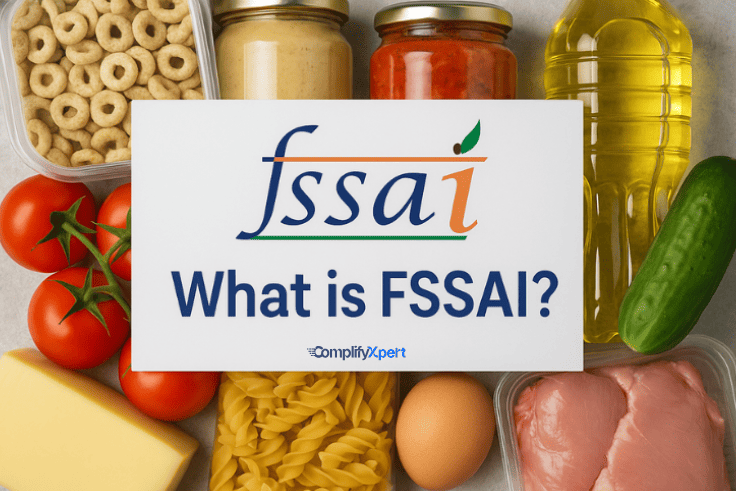
The full form of FSSAI is Food Safety and Standards Authority of India. It is a government body that checks if the food we eat is safe. It has been established according to the Food Safety and Standards Act, 2006. The FSSAI sets regulations that food companies must comply with.
FSSAI rules help protect public health by making sure food items are made, stored, and sold in clean and safe ways. Every food item you buy from a store or restaurant should meet the standards set by FSSAI to avoid risks to your health.
What is an FSSAI Registration ?
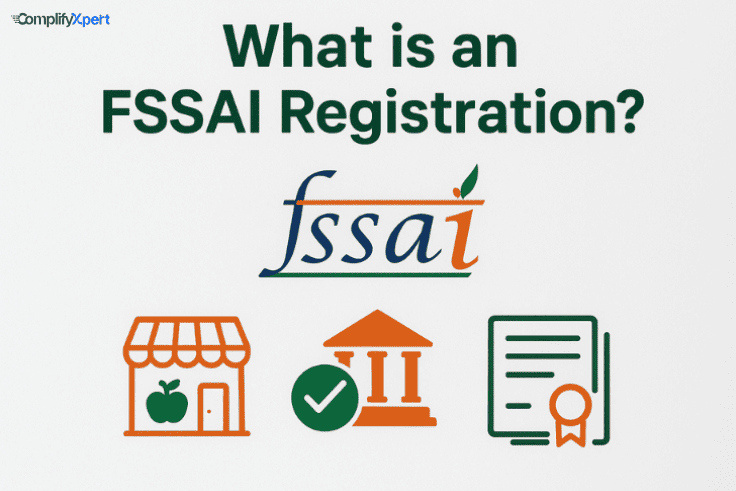
If you are initiating any food business, be it cooking at home, a food cart, or a warehouse, you must register with the FSSAI. It provides you with a 14-digit number that legalizes your food business. The number is shown on food packets and is used in food stores.
FSSAI Registration services help you complete this process smoothly and ensure you meet all required guidelines. This figure assists the government in keeping an eye on food companies and ensuring they comply with security procedures. It also gains the trust of customers since it shows your business as safe and licensed.
Without it, selling food is not allowed by law in India. Having this registration helps avoid legal issues and builds your business's credibility. The consumers will have faith and buy products from officially registered companies and those that comply with safety standards.
Types of FSSAI Registration
FSSAI has three types of food license India. Depending upon your turnover, business size, and business activity, one of the following is necessary for you.
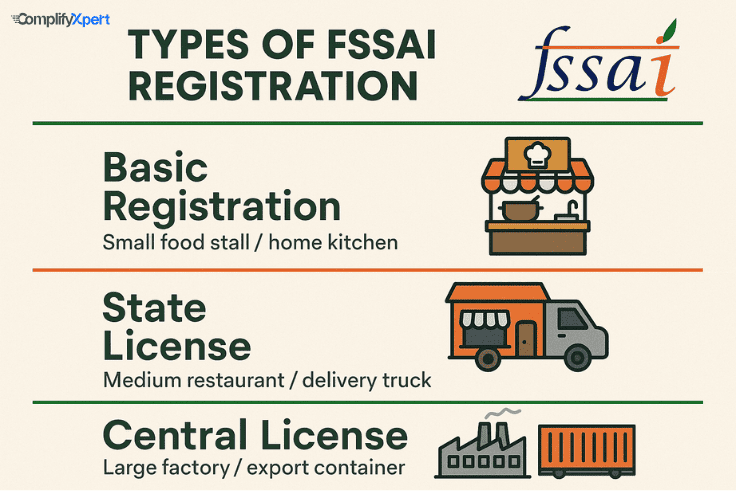
1. Basic Registration
For very small-sized businesses, such as home kitchens, food stalls, or street food stalls, with an annual turnover below ₹12 lakh. It is simple to procure and only costs a paltry ₹100 per annum. This is the best license for most start-ups and sole proprietorships of food establishments.
2. State License
This is required if your business makes between ₹12 lakh and ₹20 crore annually. It is for small-sized businesses such as small restaurants, medium-sized food processors, or food transport. The fee is between ₹2,000 and ₹5,000 per year based on the kind of business.
3. Central License
This is required for those businesses that generate more than ₹20 crore or operate in more than one state. It is also needed if your business imports or exports food. The yearly fee is ₹7,500. This license is mostly for large factories, hotel chains, or exporters.
Only after knowing these three categories can you apply for the correct FSSAI license types for your business.
FSSAI Registration Eligibility
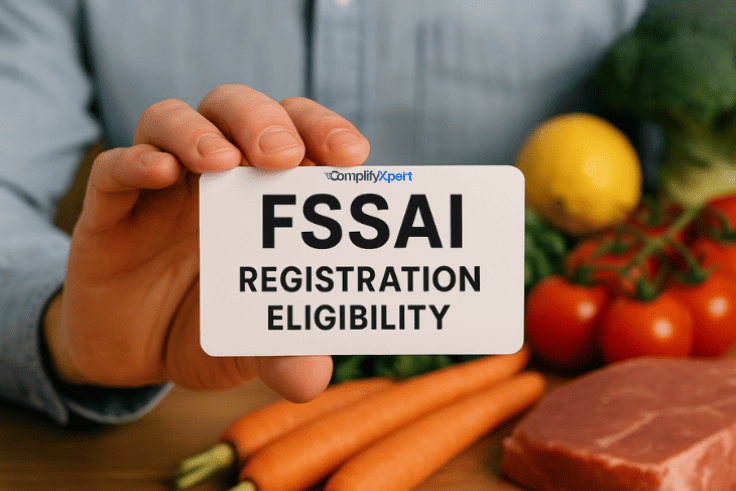
In order to obtain the right food license, you first have to determine the type of business you have and its size. If your food production is less than 100 kilograms per day, or your milk handling is under 500 litres per day, and your yearly sales are below ₹12 lakh, you are eligible for FSSAI registration for small business.
If you run a hotel, restaurant, or warehouse that handles larger quantities of food or drink, you likely need a state license. If your business sells food to more than one estate or exports goods, a central license will be necessary.
Documents Required For Obtaining the FSSAI Registration/License
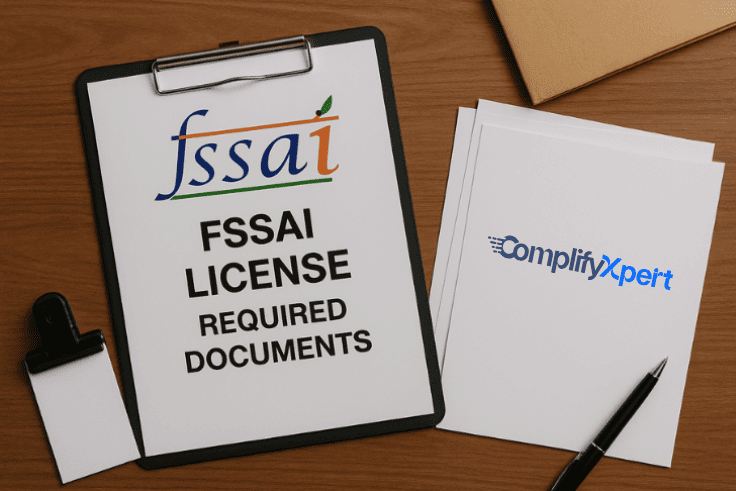
To apply for a license, you must collect some basic documents that show your identity, business type, and location. These include:
- Passport-size photo of the owner
- PAN card or Aadhaar card for ID proof
- Business address proof, like an electricity bill or a rent document
- Details of food items to be made or sold
- Trade license or shop registration (for large businesses)
- Partnership deed or company certificate (if applicable)
- Food safety plan (mostly needed for large businesses)
For a small vendor or home-based business, only simple documents are needed. But for medium and large operations, more detailed documents must be uploaded. You will need all these ready before you begin your food safety registration process.
Obtaining FSSAI Registration Online
You can apply for an FSSAI license online through the government’s official portal. The steps are simple and can be completed from home.
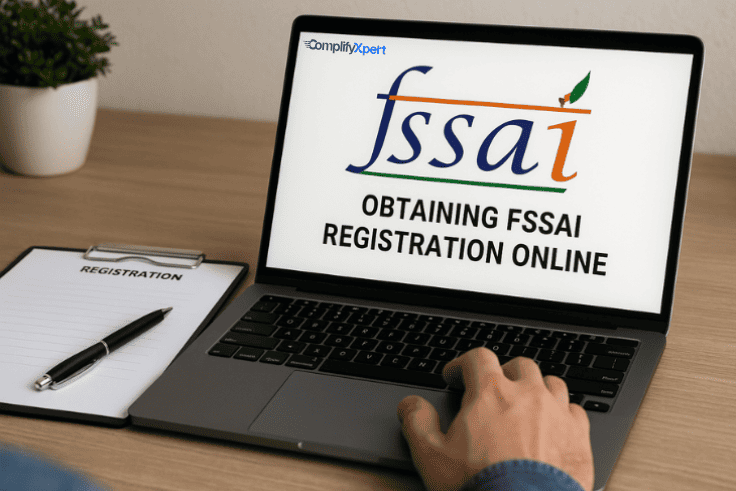
- Visit the official FoSCoS website and create a login account using your mobile number and email.
- If you are applying for Basic Registration, use Form A. For State or Central licenses, use Form B.
- Enter the business name, address, food products, number of workers, and yearly turnover. Upload all required documents.
- Fees are based on the license type and how many years you want the license to be valid. You can apply for 1 to 5 years.
- After submitting, you will get a 17-digit reference number to track the progress.
- For State or Central licenses, an FSSAI officer may visit your shop, factory, or restaurant to check hygiene standards.
- Once approved, your FSSAI certificate will be issued online. Download and display it clearly at your place of work.
Following this online FSSAI registration process makes it easy to stay legal and avoid any fines.
FSSAI Cost and Validity
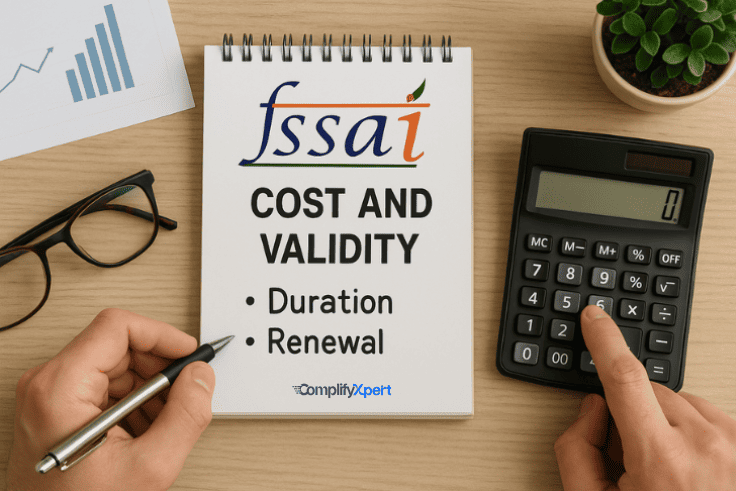
The total FSSAI cost and validity depend on the license type and the number of years you choose.
- Basic registration is ₹100 per year
- State licenses range between ₹2,000 and ₹5,000 per year
- Central license cost ₹7,500 per year
You can apply for a license that is valid for up to five years. Longer validity reduces the trouble of renewing every year and often works out to be cheaper in the long run.
Once your license is close to expiry, you should start the FSSAI process at least 30 days before the last date. If you apply late, there may be penalties or rejection. The FSSAI renewal process can also be done online through the FoSCoS website using the same account and documents.
To Conclude
Getting an FSSAI license is a very important step for anyone running a food-related business in India. It shows your customers that your food is clean and safe. Whether you are starting a food business or growing fast, picking the right type of license and completing the FSSAI registration online can help your business grow without worry.
Always apply on time, renew before expiry, and display your license clearly. Now that you know the full process of the food license in India, you are ready to run your food business the right way.






